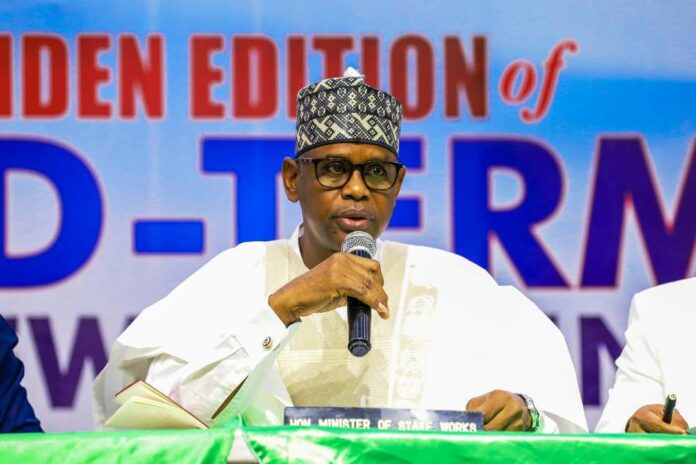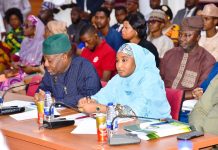The Federal Ministry of Works has convened a Maiden Mid-Term Review Meeting to assess the implementation of resolutions reached at the 29th National Council on Works (NCW). The 3-day event, which was held at the Aliyu Akwe Doma Banquet Hall, Government House, Lafia, Nasarawa State, brought together Permanent Secretaries and key stakeholders from across the federation, in charge of works and infrastructure, to review the nation’s progress in road development.
In his welcome remarks, the Honourable Commissioner for Works, Housing and Transport, Nasarawa State, Mu’azu Adamu Gosho, thanked all delegates for their presence and anticipated active participation. He acknowledged the efforts of the Technical Working Groups (TWGs), whose robust and detailed reports served as a foundation for evaluating current initiatives. According to him, the deliberations offered a strategic opportunity to reflect on achievements made, identify gaps, and prepare a comprehensive working document before the 30th National Council on Works (NCW) meeting. He encouraged delegates to critically review all submissions, offer insightful recommendations, and remain focused on actionable outcomes that will directly influence the quality and delivery of road networks, nationwide.
During the technical presentations, the TWGs highlighted progress made across several thematic areas including policy development, institutional support, technical operations, adoption of new technologies, and funding mechanisms. In terms of policy and institutional development, the reports noted that while initiatives like the National Infrastructure Development Databank and the return of State and Local Government interventions on Federal road development have shown limited progress, the National Road Fund (NRF) is moving forward with a 50% implementation rate.
Meanwhile, critical decisions such as the promotion of continuous reinforced concrete pavement (CRCP) technology and the creation of a well-defined framework for Public-Private Partnerships are still in the preliminary stages, awaiting implementation.
Institutional strengthening emerged as one of the most successful areas of progress being made. Collaboration between the Federal Ministry of Works and various state governments, particularly under the Presidential Priority Projects, has led to measurable outcomes. These achievements are further supported by active partnerships with international bodies such as the World Bank and other financial institutions, which are helping to shape alternative funding models and attracting critical investments into the road sector.
On the technical and operational fronts, efforts to enhance road safety and durability are ongoing. The setting up of weighbridge stations to curb overloading was highlighted as a major initiative with a direct impact on revenue generation and infrastructure longevity. The adoption of the National Subgrade Soils Atlas is also playing a key role in promoting scientific and sustainable road planning, which is essential for long-term success in road construction and maintenance.
The review also showcased encouraging results in the area of alternative technologies. A case in point is the Osisioma-Ekeakpara Road project in Umuahia, where the Ministry successfully implemented concrete technology as part of its commitment to exploring more durable and innovative construction methods. This approach reflects a deliberate shift towards solutions that offer extended lifespans and reduced maintenance costs for critical infrastructure.
In terms of funding strategies, the report presented by the fifth TWG revealed the highest level of implementation with an 80% achievement rate. This group, in collaboration with the Nasarawa State’s Ministries of Works, Finance, and Transport, developed long-term financial models and policy frameworks to ensure continuous investment in Nigeria’s road infrastructure. Their efforts addressed one of the sector’s most persistent challenges and insufficient funding and laid the groundwork for more sustainable infrastructure financing in the future.
Earlier in his remarks, the Permanent Secretary of, the Federal Ministry of Works and Chairman of the event, Engr. Olufunso Adebiyi, FNSE, warmly welcomed participants and thanked the Honourable Minister of Works, Engr. David Umahi, CON, FNSE, for authorising the review meeting. He described the gathering as a crucial checkpoint in the journey towards the 30th NCW with a primary objective to measure the outcomes of past decisions and prepare more informed strategies, going forward. He accentuated the importance of evaluating the adoption of CRCP technology, assessing funding alternatives such as PPPs and e-tolling, as well as undertaking a comprehensive SWOT analysis of the sector.
The Permanent Secretary also underscored the role of the six Desk Review Groups, whose inputs are vital for aligning the Ministry’s efforts with broader national priorities. He called on all delegates to remain data-driven, forward-thinking, and collaborative in their approach.
The Mid-Term Review Meeting marked a key milestone in advancing Nigeria’s infrastructure goals. By tracking progress and staying aligned with the Renewed Hope Agenda, the Federal Ministry of Works reaffirms its commitment to constructing a more unified, reliable, and enduring road system that serves the needs of all Nigerians.
Signed
Mohammad Abdullahi Ahmed,
Director, Press and Public Relations.
2nd May, 2025.






